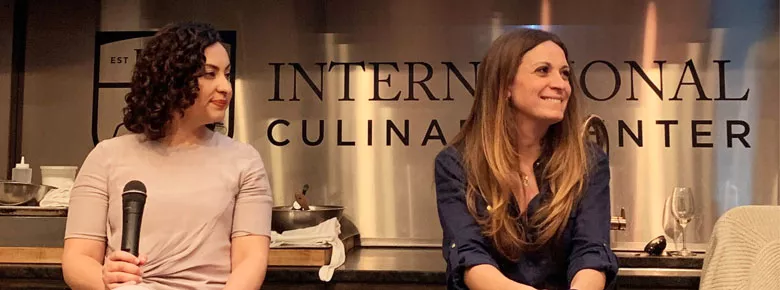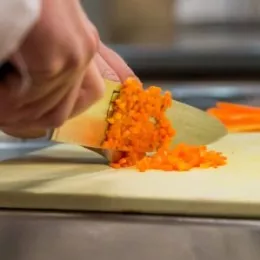In 1796, Amelia Simmons accomplished something that had never been done in America before — she published a cookbook! Contained within its 47 pages were recipes informed by British heritage and culture. Though her cookbook was the first to be written by an American, at the time, she still had to sign a contract with a publisher to get her book on shelves.
Many years later, it’s now more difficult than ever to score a cookbook deal. Despite the challenges, our alumna Anna Francese Gass (Culinary Arts ‘12) was able to do just that, publishing her first cookbook this past May. But she didn’t just pull it off — she scored a cookbook deal with HarperCollins, one of the largest publishing houses in the world. So, how did she do it you ask? For starters, she did more than just jot down recipes, walk into publishing houses and receive contracts to print copies of her dream project. She put years of dedication into solidifying the initial pitch for Heirloom Kitchen that she eventually brought to publishers, while also building her personal brand.
So, what were the steps that Gass took to accomplish this feat? And what made HarperCollins finally draft up that longed for book deal contract? (after all, they don’t just say yes to everyone!) Here are the industry secrets we learned from Gass and HarperCollins on how to get your cookbook published.
BOOK AGENTS 101
First, think about the publishing route that you want to pursue. Do you want to self publish? (read: it can be done! Our grad, Jason Licker, self-published Lickerland: Asian-Accented Desserts and received a James Beard Award nomination for it.) This avenue is arguably the road less traveled, but certainly an option. Or, do you want to work with a book agent? These are the people that help to open doors for you at publishing houses (note: publishers are legally not allowed to take unsolicited book pitches, so a book agent is necessary for introductions).
However, agents receive manuscripts all of the time, so your pitch has to be on point and sans loose ends. Insider’s tip: think about if you know anyone who has published a cookbook — they may be able to introduce you to their agent.
Once you’ve found yourself a book agent, it’s time to start finessing your initial pitch to make it more enticing. Today’s market for cookbooks is saturated, so it’s important to make yours uniquely you. Here’s what Gass’ book agent recommended to make her overall package stronger.
1) BUILD AN AUDIENCE
Although Gass had an Instagram audience of around 25,000 when she first started, her agent pushed her to continue to grow it. Remember: these are some of your biggest supporters who will be excited to buy your cookbook! Now, Gass has an engaged following of almost 90,000 who are interested in what she has to say.
2) GAIN EXPERIENCE
After graduating from ICC, Gass got a job in Food52’s test kitchen with the help of ICC’s Career Services team. From there, she went on to work as a recipe editor for Martha Stewart Living. This made Gass’ case for a deal extremely strong: she had the chops to write recipes and she had been published during her time at Food52. She continued to write for publications, making her portfolio of published articles grow, which in turn, made her a stronger candidate.
3) BE COMMITTED
Ask yourself: are you really passionate about this project? This will turn into a second full-time job, as publishing a cookbook requries a lot of heavy lifting. Make sure that you really love what you’re creating and put your heart into it. This will jump off the pages of your pitch.
4) THINK ABOUT THE TIMING
Like everything in life, timing is key, even with scoring a cookbook deal. Unfortunately, this isn’t something as easy to control. Sometimes, things have to work in your favor. Think about what’s happening in the news and know that relevancy may help your case.
SO, NOW IT’S TIME FOR A CONTRACT
After you’ve worked with your book agent to tidy up any loose ends in your pitch (sometimes it can take years to get it right), it’s time to start meeting with publishing houses! When your pitch finally lands on the desk of an editor at a publishing house, they’ll immediately start looking for certain tells. Cristina Garces, who is an editor at HarperCollins and worked with Gass for years — from pitch to published — divulged her secrets of what she looks for in a compelling pitch.
1) ONLINE PRESENCE AND EXPERIENCE
The first thing that Garces does when reviewing a pitch is Google the person. While this may seem unfair — you’ve probably put years of hard work into your project — you need to have an audience who is interested in what you have to say.
Garces could tell that Gass had followers who were engaged, but she could also see that Gass had the skills to back up what she was offering. She had put in the work, both through her culinary school training and her resume. Garces could also see that Gass’ recipes would be well tested and edited from her experience as a test kitchen editor and writer.
2) STRONG VOICE AND CLEAR POINT OF VIEW
It will be clear to an editor when your project is ready to go and well thought out. While this is one of the most important aspects, you’ll also set yourself apart from the crowd by sounding like yourself — not who you think the publisher wants you to be. Stay true to your story and showcase your passion on the pages.
3) A STORY THAT’S UNIQUELY YOURS
Like Gass’ book agent warned, the cookbook market is crowded. It’s vital to have your own niche, and not just another cookbook about breakfast foods (yes, everyone loves breakfast foods, but what makes yours out of the ordinary?) However, it’s also essential to cast a wide net so that enough people will be interested. It’s all about finding the sweet spot between being unique and all encompassing.
 Once you’ve worked tirelessly with your book agent to land a contract at a publishing house, the real, fun work will begin! It will take years of dedication to make your dreams a reality, but it IS possible — just ask some of our many grads who’ve done it! If you’re interested in buying a copy of Heirloom Kitchen, you can purchase one here.
Once you’ve worked tirelessly with your book agent to land a contract at a publishing house, the real, fun work will begin! It will take years of dedication to make your dreams a reality, but it IS possible — just ask some of our many grads who’ve done it! If you’re interested in buying a copy of Heirloom Kitchen, you can purchase one here.
This blog post was originally published by the International Culinary Center (ICC), founded as The French Culinary Institute (FCI). In 2020, ICE and ICC came together on one strong and dynamic national platform at ICE's campuses in New York City and Los Angeles. Explore your culinary education where the legacy lives on.



